Are you struggling with addiction and overwhelming emotions that seem impossible to control? You deserve a treatment approach that addresses both your substance use and the underlying emotional challenges driving your addiction. Dialectical behavioral therapy (DBT) offers you a proven path to recovery by teaching practical skills for managing intense emotions, improving relationships, and building a life worth living without substances.
What is dialectical behavioral therapy?
Dialectical behavioral therapy represents a comprehensive treatment approach specifically designed to help you manage intense emotions while overcoming addiction. You’ll learn four core skill sets that transform how you handle life’s challenges: mindfulness, distress tolerance, emotion regulation, and interpersonal effectiveness. Treatment centers recognize DBT as one of the most effective therapies for individuals who struggle with both addiction and emotional dysregulation.
Your DBT journey focuses on accepting yourself as you are while simultaneously working toward positive change. This “dialectical” approach means you’ll develop the ability to hold two seemingly opposite truths: you are doing the best you can, and you need to do better. Through structured sessions and practical exercises, you’ll build a toolkit of coping strategies that replace substance use with healthier alternatives.
What are the signs you need DBT for addiction?
You may benefit from DBT if you’re experiencing multiple challenges alongside your substance use. Recognizing these signs helps you understand when specialized treatment becomes necessary:
- You use substances to cope with overwhelming emotions or emotional pain
- Your relationships suffer due to intense reactions or fear of abandonment
- You experience rapid mood swings that feel uncontrollable
- Self-harm behaviors accompany your substance use
- You struggle with impulsive decisions that lead to negative consequences
- Past trauma continues to influence your current behavior patterns
- You feel empty or have an unstable sense of identity
- Anger outbursts damage your relationships and goals
- You experience chronic feelings of emptiness or boredom
- Traditional addiction treatment hasn’t provided lasting results
- You have difficulty tolerating distress without using substances
- Suicidal thoughts occur alongside your addiction struggles
How does DBT work in addiction treatment?
Your DBT treatment integrates seamlessly into comprehensive addiction programs, whether you’re in drug rehab, partial hospitalization program (PHP), intensive outpatient program (IOP), or outpatient program (OP). Treatment centers structure DBT to provide you with immediate skills while addressing long-term recovery goals.
In individual therapy sessions, you’ll work one-on-one with a trained DBT therapist who helps you apply skills to your specific challenges. Your therapist guides you through diary cards that track emotions, urges, and skill use, creating accountability and insight into your patterns. Between sessions, you’ll have access to phone coaching for real-time support during crisis moments.
Group skills training forms another essential component of your DBT experience. You’ll join others in learning and practicing the four DBT modules over approximately 24 weeks. These groups provide a supportive environment where you can share experiences and learn from peers facing similar challenges. The combination of individual and group work ensures you receive both personalized attention and community support throughout your recovery journey.
The four core DBT skills for recovery
Your DBT treatment revolves around mastering four interconnected skill sets that directly address addiction and emotional challenges:
Mindfulness skills teach you to observe your thoughts and feelings without judgment. You’ll learn to stay present rather than escape through substance use. These foundational skills help you recognize triggers and cravings without automatically acting on them.
Distress tolerance skills provide you with crisis survival strategies that replace substance use. You’ll master techniques like TIPP (temperature, intense exercise, paced breathing, paired muscle relaxation) and distraction methods that help you ride out intense urges without giving in to them.
Emotion regulation skills help you understand and manage feelings that previously led to substance use. You’ll learn to identify emotions accurately, reduce vulnerability to negative emotions, and increase positive emotional experiences in your daily life.
Interpersonal effectiveness skills strengthen your relationships and communication abilities. You’ll develop assertiveness techniques, learn to set healthy boundaries, and build relationships that support your recovery rather than enable addiction.
Why is DBT effective for addiction treatment?
Research demonstrates that DBT significantly improves addiction treatment outcomes. Studies show that 96% of individuals receiving DBT complete their treatment program, compared to only 77% in traditional approaches. You’re more likely to achieve lasting recovery when your treatment addresses both addiction and underlying emotional dysregulation.
Treatment centers have found that DBT participants show remarkable improvements in substance abstinence. Recent studies indicate that 87.5% of DBT participants achieve full remission from substance dependence for at least four weeks, compared to just 33.3% in alternative treatments. These statistics reflect DBT’s unique ability to provide you with practical tools for managing the complex emotions that often fuel addiction.
The therapy’s effectiveness extends beyond immediate abstinence. You’ll experience improvements in emotional stability, relationship quality, and overall life satisfaction. Meta-analyses show that DBT produces medium to large effect sizes for increasing substance abstinence, with benefits sustained months or even years after treatment completion.
What happens during DBT sessions?
Your DBT experience in addiction treatment follows a structured yet flexible approach tailored to your needs. Individual therapy sessions typically last 50-60 minutes weekly, where you’ll review your diary card with your therapist. Together, you’ll identify patterns in your emotions and behaviors, problem-solve current challenges, and practice applying DBT skills to real-life situations.
Skills group sessions run for approximately 2.5 hours weekly, providing intensive training in each DBT module. You’ll participate in discussions, role-plays, and exercises designed to help you master each skill. Homework assignments between sessions ensure you practice new skills in your daily life, building confidence and competence over time.
Phone coaching offers you real-time support when facing urges or emotional crises. Your therapist provides brief calls to help you apply DBT skills in the moment, preventing relapse and reinforcing your learning. This 24/7 support system ensures you never face challenging moments alone during your recovery journey.
How DBT integrates with addiction programs
Treatment centers seamlessly incorporate DBT into all levels of addiction care. In drug rehab settings, you’ll receive intensive DBT alongside medical support and other therapeutic interventions. The structured environment allows you to focus entirely on learning and practicing skills without outside distractions.
Partial hospitalization programs (PHP) offer you DBT during daytime hours while returning home in the evenings. This level of care provides intensive skill development while allowing you to practice in real-world settings. You’ll attend multiple DBT sessions weekly, including both individual and group components.
Intensive outpatient programs (IOP) adapt DBT to fit your work or school schedule. You’ll attend sessions several times per week, typically in the evenings, while maintaining daily responsibilities. This format helps you integrate DBT skills directly into your routine.
Outpatient programs (OP) provide ongoing DBT support as you transition to independent recovery. Weekly sessions help you maintain and strengthen skills while navigating life’s challenges without intensive support.
Common questions about DBT for addiction
How long does DBT treatment take?
Standard DBT treatment spans approximately six months to one year, though your specific timeline depends on individual progress and needs. You’ll complete the full skills training curriculum while working through personal challenges in individual therapy. Many treatment centers offer extended DBT support to ensure lasting recovery.
Can DBT help with specific types of addiction?
DBT effectively treats various substance use disorders, including alcohol, opioids, stimulants, and polysubstance use. The skills you learn apply universally to managing cravings and emotions, regardless of your substance of choice. Treatment centers often see particularly strong results when addiction co-occurs with emotional dysregulation or trauma.
What if I’ve tried other treatments without success?
DBT specifically benefits individuals who haven’t responded well to traditional addiction treatment. Your past struggles don’t predict DBT outcomes, as this approach addresses underlying emotional patterns that other treatments may miss. Many successful DBT participants previously cycled through multiple treatment attempts before finding lasting recovery.
How is DBT different from other addiction therapies?
Unlike treatments focused solely on abstinence, DBT teaches you practical skills for managing life’s challenges without substances. You’ll learn specific techniques rather than just talking about problems. The balance between acceptance and change, combined with 24/7 skill coaching support, sets DBT apart from conventional approaches.
Contact Assure Recovery today
You don’t have to struggle with addiction and overwhelming emotions alone. Help is available now through evidence-based DBT treatment that addresses both your substance use and underlying emotional challenges. Take the first step toward building a life worth living.
Call Assure Recovery at (833) 530-0291 to speak with a compassionate admissions specialist who understands your unique needs. Don’t wait another day to start your recovery journey. Contact Assure Recovery now and discover how DBT can transform your relationship with emotions and substances. Your path to lasting recovery begins with one phone call.



